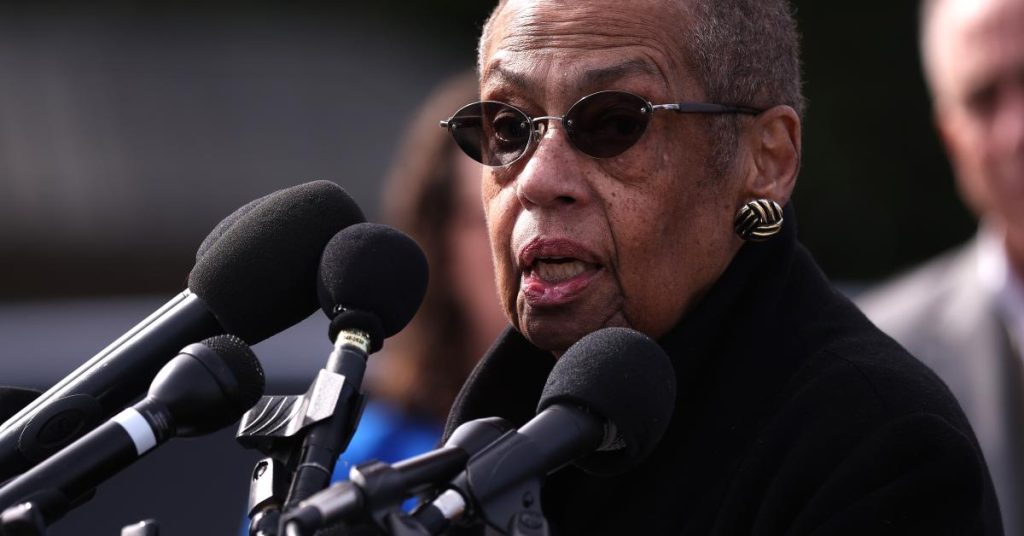Eleanor Holmes Norton, the Democratic delegate-at-large for Washington, D.C., and Maryland’s Democratic Sen. Chris Van Hollen announced plans to propose legislation granting full authority over the D.C. National Guard to the district. President Donald Trump, on the same day, voiced his intention to tackle crime in the capital by implementing Section 740 of the District of Columbia Home Rule Act. This act permits the president to assume temporary control of the city’s police force if he deems the situation an emergency.
Trump also mobilized 800 D.C. National Guard troops, expected to arrive in the city soon, to provide various forms of support to local law enforcement. The president justified his actions by pointing out the city’s crime rate, which remains among the highest nationwide, although reports indicate a decrease in 2024. He mentioned specific incidents, like a shooting near a Jewish center and a violent carjacking by juveniles, to underscore his concerns.
Sen. Van Hollen criticized Trump’s move, calling it an “authoritarian power grab” and suggested it reflects a broader national crisis. He accused Trump of acting like a dictator and pushing democracy to its limits. Van Hollen argued that while D.C. statehood remains a goal, it is crucial to ensure the district has full control over its National Guard and police department to avoid such presidential overreach.
Despite acknowledging the serious crime issue, Van Hollen contended that Trump’s decision to block the D.C. city council from receiving $1 billion in funding was misguided. He believed this funding could have supported the D.C. police. Van Hollen emphasized that instead of deploying the military, Trump should return the funds and allow D.C. to manage its own affairs.
The proposed legislation faces significant challenges in a Congress led by Republicans. It aims to amend the Home Rule Act, removing the president’s authority to federalize the Metropolitan Police Department. The bill also seeks to designate the mayor of D.C. as the head of the National Guard, similar to governors in states.
Norton, who represents D.C. residents in the House without voting power, argues that these legislative efforts are steps toward greater autonomy for the district. She believes that until statehood is achieved, repealing presidential control over local law enforcement is crucial. By rallying support for her bills, Norton hopes to move D.C. closer to self-governance.
The bills are set to be introduced in both chambers of Congress after lawmakers return from their August recess. Norton is committed to advocating for these changes, leveraging her position to gather support. This legislative push reflects a broader desire to grant D.C. more control over its vital affairs.
While the path to statehood remains uncertain, Norton and Van Hollen stress the importance of empowering the district. They believe that local control over the National Guard and police is essential for D.C.’s self-governance. Their efforts aim to prevent future instances of presidential overreach in the district.
Trump’s critics, however, argue that his actions are a misuse of power, further deepening the divide over D.C.’s autonomy. The debate highlights the ongoing struggle between federal control and local governance in the capital. The proposed legislation aims to address these concerns by rebalancing authority.
Supporters of the legislation see it as a necessary step toward protecting D.C. from federal interference. They argue that granting local control over the National Guard and police aligns with democratic principles. By doing so, they aim to ensure that D.C. can manage its own affairs without undue outside influence.
The conversation around D.C. statehood and autonomy continues to evolve, with Norton and Van Hollen leading the charge. Their legislative proposals reflect a commitment to advancing the district’s interests on the national stage. As these discussions progress, the future of D.C.’s governance hangs in the balance.
Despite the challenges, Norton remains hopeful that her efforts will garner the necessary support in Congress. She is determined to see D.C. gain more control over its essential functions. Meanwhile, Van Hollen continues to advocate for D.C.’s rights, pushing back against what he sees as authoritarian overreach.
In the political landscape, the debate over D.C.’s autonomy underscores larger themes of governance and federalism. Advocates for change argue that D.C. deserves the same rights and responsibilities as other states. Their efforts aim to transform the district’s relationship with the federal government.
As the legislative process unfolds, the conversation around D.C.’s future remains dynamic and complex. Norton and Van Hollen’s proposals are part of a broader movement seeking to redefine the district’s role within the United States. The outcome will significantly impact D.C.’s governance and autonomy.




3 Comments
Empty gesture. Article 2 and Title10 of the US code. Democrats still insisting the we are a democracy. No policies. No ideas.
Just who do you think you are Eleanor.?
Do you think your running our Country.?
Do you think your over the President and over rule his Lawful order.?
The fact is that you love the high crimes committed in DC, just like the Communist Democrats approve of high crimes across America.
Your no more better than feces on the sidewalks in L.A.by homeless Americans.
You can’t even control your own police force there is no way in hell should you have control over the national guard. You destroyed our cities by doing nothing to stop all this violence. You don’t even know how to handle your own problems.